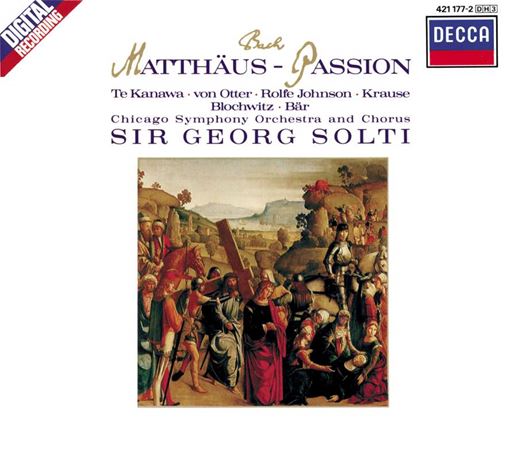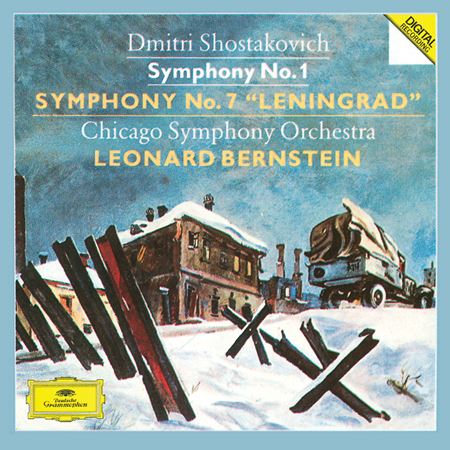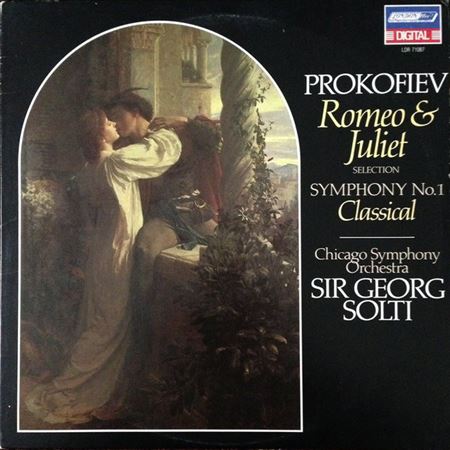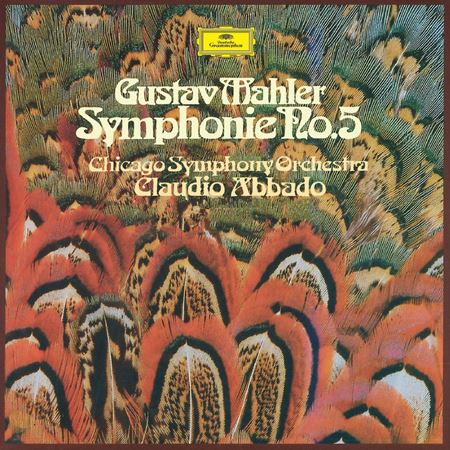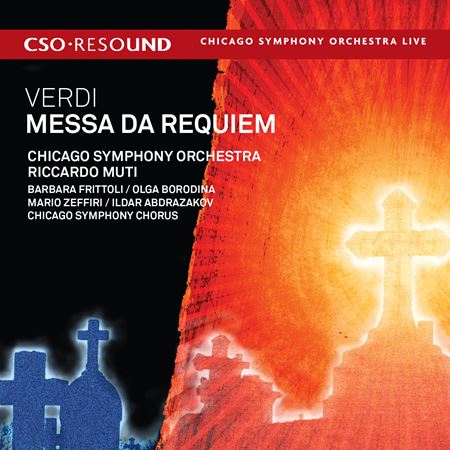Andrew Lewis on the podium with Bella Voce and the Bella Voce Sinfonia at St. Luke's Episcopal Church in Evanston in November 2018
Joe Mazza, Brave Lux
The Chicago Symphony Orchestra’s commercial recording legacy began on May 1, 1916, when second music director Frederick Stock led the Wedding March from Mendelssohn’s A Midsummer Night’s Dream for the Columbia Graphophone Company. The Orchestra has since amassed an extraordinary, award-winning discography on a number of labels — including Angel, CBS, Deutsche Grammophon, Erato, London/Decca, RCA, Sony, Teldec, Victor and others — continuing with releases on the in-house label CSO Resound under tenth music director Riccardo Muti. For My Favorite CSO, we asked members of the Chicago Symphony family for their favorite recordings (and a few honorable mentions) from the Orchestra’s discography.
With degrees from Northwestern University and the Eastman School of Music, Andrew Lewis is artistic director of Bella Voce and the Bella Voce Sinfonia, music director of the Elgin Master Chorale, director of music and choirmaster at St. Luke’s Episcopal Church in Evanston and assistant conductor of the Chicago Symphony Chorus. He has been a guest lecturer at Concordia University Chicago, Loyola University Chicago and Garrett-Evangelical Theological Seminary, and he has taught conducting at DePaul University. Lewis has been a guest conductor with the Milwaukee Symphony Chorus and on several occasions with the Elgin Symphony Orchestra.
BACH Saint Matthew Passion, BWV 244
Recorded in Orchestra Hall in 1987 for London
Sir Georg Solti conductor
Kiri Te Kanawa soprano
Anne Sofie von Otter mezzo-soprano
Anthony Rolfe Johnson tenor
Tom Krause bass
Hans Peter Blochwitz tenor
Olaf Bär baritone
Richard Cohn baritone
Patrice Michaels soprano
Debra Austin mezzo-soprano
William Watson tenor
Chicago Symphony Chorus
Margaret Hillis director
Glen Ellyn Children’s Chorus
Doreen Rao director
“I first heard this unparalleled masterwork as a teenager, and it was this recording. I have since become an impassioned proponent of the historically informed performance movement, but this recording still grabs me. The sense of drama and eloquence — never ponderous or self-indulgent — as well as the clarity of articulation and feeling for line and color, all add up to a magnificent interpretation. The cast of soloists is perfectly suited to this performance, and I especially am in awe of Hans Peter Blochwitz as the evangelist. He ranks up there with Peter Schreier and Anthony Rolfe Johnson (who is the tenor soloist here) as one of the greatest evangelists of all time. But it really is the Chorus that stands out. I had never ever heard such impeccable attention to every conceivable detail coupled with such unbridled ferocity. Listen in particular to the duet, “So ist mein Jesus nun gefangen,” with its biting choral interjections, which then segues to the chorus, “Sind Blitze, sind Donner.” I was absolutely gobsmacked, and, much to my parents’ annoyance, listened to that thing over and over as loudly as I could without blowing out our speakers."
SHOSTAKOVICH Symphony No. 1 in F Minor, Op. 10 and Symphony No. 7 in C Major, Op. 60 (Leningrad)
Recorded in Orchestra Hall in 1988 for Deutsche Grammophon
Leonard Bernstein conductor
1990 Grammy Award for Best Orchestral Performance
“This is Leonard Bernstein’s only recording with the CSO, which is such a shame, because the result is absolutely gorgeous and thrilling. Our friend John von Rhein wrote, ‘I cannot recall a season finale of recent years, in fact, that sent the audience home on such a tidal wave of euphoria.’ To me, Bernstein’s recordings often represent extremes of interpretation, and I think this one is no exception. Take the first movement of the Leningrad. The soft and tender moments are about as gentle as humanly possible, while leading inexorably to a great orchestral outburst in the march. There’s a wildness to it that is hard to describe, yet everything remains in balance. The fact that this was recorded live adds to the feeling that what Bernstein achieves should be impossible, yet this brilliant orchestra delivers.”
PROKOFIEV Excerpts from Romeo and Juliet, Op. 64 and Symphony No. 1 in D Major, Op. 25 (Classical)
Recorded in Orchestra Hall in 1982 for London
Sir Georg Solti conductor
“This recording ruined all other recordings of Romeo and Juliet for me! Listen to Dance of the Knights. Like the Bernstein/Shostakovich pairing above, Sir Georg Solti finds both grace and menace in the orchestral sound, and the result is so very beautiful.
"Musically speaking, there are other parts of this suite I find so charming and invigorating, but to hear what makes this orchestra and recording so special, just listen to the introduction to act 3. The buildup to those jarring dissonances is achieved with an absolute unanimity in their crescendo, and later, when those big, ugly chords arrive, they are perfectly balanced. The cutoff is clean and resolute, revealing gentle string chords that feel as though they were there the entire time. It’s another study in extreme contrast, perfectly executed.”
MAHLER Symphony No. 5
Recorded in Orchestra Hall in 1980 for Deutsche Grammophon
Claudio Abbado conductor
“I know. I’m supposed to cite one of Sir Georg Solti’s recordings of Mahler’s Fifth Symphony. All of Solti’s recordings of Mahler’s symphonies with the CSO are justifiably regarded as benchmarks. But Claudio Abbado is one of my favorite conductors, and he had a fruitful relationship with the Orchestra for 20 years. I could go on with all of the usual superlatives regarding this brilliant orchestra and the way it plays Mahler, but I think we’re all pretty familiar with those. What really impresses in this recording is, for instance, Abbado’s rubato in the Adagietto. The feeling of restraint and yearning is fully formed without gilding the lily, so to speak. I get the impression that all intentionality is squarely focused on the music and not on the ego of the conductor.”
VERDI Messa da Requiem
Recorded in Orchestra Hall in 2009 for CSO Resound
Riccardo Muti conductor
Barbara Frittoli soprano
Olga Borodina mezzo-soprano
Mario Zeffiri tenor
Ildar Abdrazakov bass
Chicago Symphony Chorus
Duain Wolfe director
2010 Grammy awards for Best Classical Album and Best Choral Performance
“I have to come back to the truly great Chicago Symphony Chorus for my last selection. Of course, we are all lucky that so many incredible performances of Verdi’s Requiem were made here in Chicago. But the one for which the Orchestra and Chorus won a Grammy in 2010 is head and shoulders above the rest of any recording of the work ever made. Combine the fact that Maestro Muti is the greatest living Verdi interpreter with the fact that Duain Wolfe’s chorus is the best of its kind in the world, and you have a combination that just can’t be matched. Listen to the sensuousness of the ‘x’ in ‘Lux’ in the opening movement. Listen to the impossibly rich tone, sung pianissimo. Then, in the ‘Dies irae,’ listen to how the Chorus can actually compete with the monstrously large orchestra playing just about as loudly as it can. Or the opening of the ‘Rex tremendae,’ where the Chorus cries out and then turns on a dime to such a sweet tone, perfectly balanced and in tune. Now go listen to those spots in other recordings. All pale in comparison.”
A few honorable mentions:
- SHOSTAKOVICH Symphony No. 13, Op. 113 (Babi Yar) with Riccardo Muti for CSO Resound (2018)
- BEETHOVEN The Nine Symphonies with Sir Georg Solti for London (1986-1990)
MFC-032
